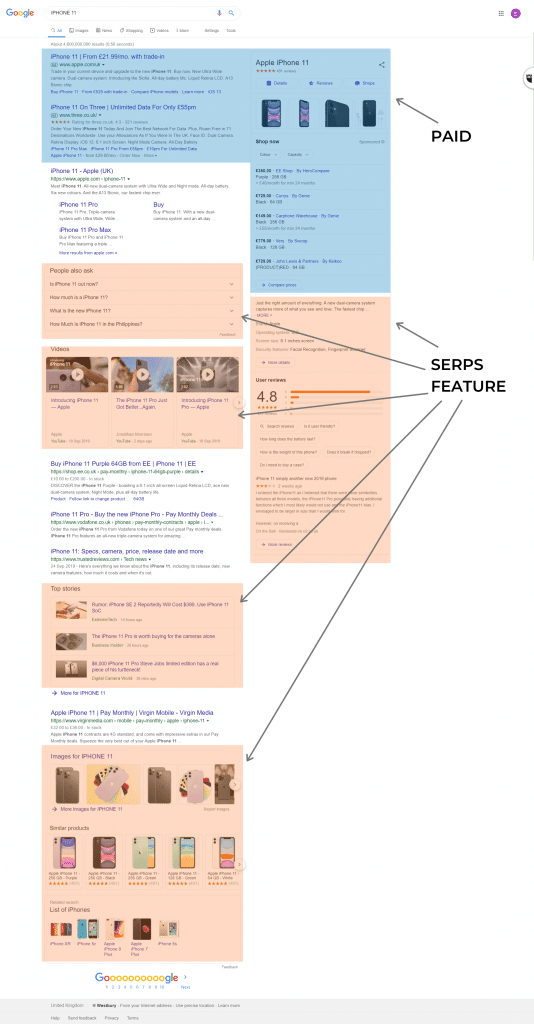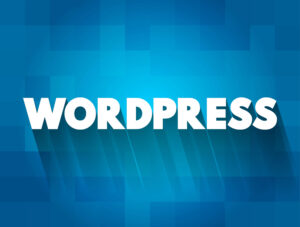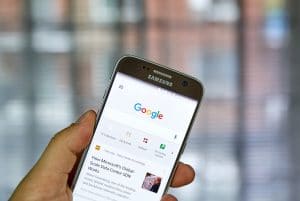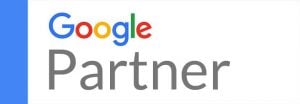Search Engine Optimisation (SEO) can be a bit of a mystery in the digital marketing world, with few short-term or instant rewards but the chance of massive long-term gains.
A search engine is a site like Google or Bing. You use them to search for the websites, products, services or content you are looking for. The search engine you are using then responds to your search with a list of links to websites that are relevant to the search.
Most of the time, you will find what you are looking for within the first few links offered to you by the search engine. This means, that as a business owner with a website, it is important to appear as high up in this list as possible when searches are made which are relevant to the services or products your business is offering.
92% of all clicks take place on the first page of the search engine results. If your website is not ranking on the first page of the search engine results, then most internet users will not find it.
This is search engine optimisation.
SEO Creates Organic Results
You might notice that most of Search Engine Results Page (SERP) is taken up with different elements including paid ads and shopping feeds (see the blue fields in the image below). This means companies have paid to appear at the top of the results for this search and reduces the amount of space available for organic (non-paid) results (see spaces that are not highlighted in the image below).
Within the SERPS there are also various SERP Features (highlighted in orange in the image below, these can change depending on the search engine and the search query used. These SERP features are organic and some can be influenced by SEO, such as featured snippets (an organic result that displays an answer inside a box). On the whole these features further reduce the space available for organic results.


White Hat vs. Black Hat SEO
There are different ways to improve your SEO. Search engines publish best practice guidelines and it is vitally important these are followed or you site could be hit with a penalty. There are other are ways of “gaming” the search engines for an often quicker, yet less valuable or ethical, win.
There are different ways to improve your SEO. Search engines publish best practice guidelines and it is vitally important these are followed or you site could be hit with a penalty. There are other ways of “gaming” the search engines for an often quicker, yet less valuable or ethical, win.
If you are caught attempting to “game” Google, your website will be penalised. Google is prepared to penalise large brands, including Interflora, BMW and The New York Times, for breaking the rules.
The penalties can range from downgrading your organic rankings for key search phrases, to a complete ban from the search engine results even for your business name or website address.
White hat SEO:
Implementing SEO techniques, best practices, and strategies that follow search engine rules. The main aim of this is to provide value to searches, that your website content matches the search query, and that your website shows high levels of expertise, authority and trust.
Black hat SEO:
Refers to strategies that try to fool search engines. While these tactics can work, it puts websites at risk of being penalised by the search engines, which can negatively affect an entire business. Black hat SEO is always time limited as search engines change their algorithms regularly to crack down on black hat techniques.
It’s always best to make sure that your Digital Agency stick to white-hat SEO. It comes without risk and will benefit your brand most in the long run.
On Page vs. Off Page
The search engine algorithms (the code used to index, sort and rank websites) are very complicated. There are currently over 200 parts of the Google search algorithm and it is always being updated.
Optimising your website for search engines falls under two main categories: On page SEO (things you can do to or on your website and have direct control over) and off-page SEO (things you can optimise or make happen online but off your website).
In terms of importance, and the influence on organic rankings, the division is roughly 50/50 between on-page and off-page SEO.
On-Page SEO : optimising the technical side of your website, making sure it is set up and updated in a way that makes it easy for search engines to know exactly who you are, what you do, and where you are located.
Key on-page SEO elements include:
- Making sure your site’s structure is as easy as possible for users to navigate and for search engines to index
- Making sure your page speed is as fast as possible (google doesn’t want to suggest slow-loading websites)
- Mobile friendly website structure
- Regularly posting quality content that provides value to the user
- Including key product, service and location signals
- Including company information, history and contact details
- Customer reviews and testimonials including links to third party sources
Off-Page SEO: optimising things off of your own website in order to improve its ranking in SERPS. Inbound links to your website need to be built with patience and precision. A key black hat tactic is to create 1,000s of links to a website in a short space of time from poor quality domains. Poor quality links are one of the key reasons a website can be penalised by the search engines.
Key off-page SEO elements include:
- Authoritative sites
linking to your site including:
- Links from key industry sources
- Links from key local websites
- Links from trusted third-party review website
- Citations on key data points with the Google N A P (name, address, phone no.) infrastructure. (This basically means making sure your company is featured in as many online directories as possible).
A Marathon not a Race
The rewards of SEO are rarely instant, and you need to always be updating your site. No matter how well your initial website’s SEO set up was, if it is not continually worked on, it will most likely get worse over time. The search engines are constantly changing the algorithms. There were 14 core changes to the Google search algorithm in 2018, and it is important you keep your websites’ SEO up to date.
SEO is not about quickly getting your site to the top of Google. It’s about doing the right things for your customers: that’s what the search engines want you to do, and that’s how you get to the top.
Ultimately, if you’rebuilding relationships with other businesses and clients, putting out valuable content, and aren’t trying to trick the system, then your Google rankings should slowly but surely continue to improve without risk.
We’ve tried to simplify SEO as much as possible, but we understand that it really isn’t a simple thing. Luckily, we are happy to help with any SEO problems you may have.












